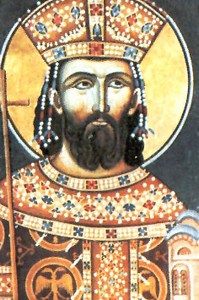
Lazar Hrebeljanović was a medieval Serbian ruler who created the largest and most powerful state on the territory of the disintegrated Serbian Empire. Lazar's state, referred to by historians as Moravian Serbia, comprised the basins of the Great Morava, West Morava, and South Morava rivers. Lazar ruled Moravian Serbia from 1373 until his death in 1389. He sought to resurrect the Serbian Empire and place himself at its helm, claiming to be the direct successor of the Nemanjić dynasty, which went extinct in 1371 after ruling over Serbia for two centuries. Lazar's programme had the full support of the Serbian Orthodox Church, but the Serbian nobility did not recognize him as their supreme ruler. He is often referred to as Tsar Lazar Hrebeljanović ; however, he only held the title of prince.
FleishmanHillard Inc. is a public relations and marketing agency founded and based in St. Louis, Missouri. It was acquired by Omnicom Group in 1997, becoming part of the Diversified Agency Services (DAS) division. The company was founded in 1946 by Alfred Fleishman and Robert E. Hillard.

Maximilian Ulysses, Reichsgraf von Browne, Baron de Camus and Mountany was an Austrian military officer, one of the highest-ranking officers serving the Habsburg Emperor during the middle of the 18th century. An Irish refugee, he was a scion of the Wild Geese.

Marc Lazar is a french academic who serves as a professor and director of the Doctoral School at the Paris Institute of Political Studies. He is also the President of the LUISS school of government in Rome. He manages a research group on contemporary Italy with CERI. He is a specialist of the History of left-wing parties, and Italian politics. He graduated from the School for Advanced Studies in Social Sciences (EHESS).

Zachary Rodin Fleishman is an American professional tennis player.
Science fiction and fantasy in the Serbia has a long and varied history.
Charles E. Dibble was an American academic, anthropologist, linguist, and scholar of pre-Columbian Mesoamerican cultures. A former Distinguished Professor of Anthropology at the University of Utah, Dibble retired in 1978 after an association with the university as lecturer and researcher spanning four decades. Post-retirement Dibble continued to conduct and publish research in his area of expertise, studies of Mesoamerican historical literature and the historiography of conquest-era Mesoamerican cultures, in particular those of the Aztec and others of the central Mexican altiplano. Among many contributions to the field Dibble is perhaps most recognised for his collaboration with colleague Arthur J.O. Anderson, producing the modern annotated translation into English of the volumes of the Florentine Codex.
Caleb Powell Haun Saussy is University Professor at the University of Chicago.
"Rothschild's Violin" is a short story by Anton Chekhov.
Ya vse znayu was a non-partisan Russian language newspaper published in Riga in 1932. P. Merkurov was the editor of the newspaper. Only four issues were published.

Alexey Alexandrovich Surkov was a Russian Soviet poet, editor, literary critic and high-profile nomenklatura figure, the head of the Soviet Union of Writers in 1953–1959, notorious for his role in the persecution of Boris Pasternak
Count Johann Georg von Browne was an officer in the Russian army, and settled in Vienna where he was a patron of Ludwig van Beethoven during the composer's early career.
Spiridon was the Patriarch of the Serbian Patriarchate of Peć from 1380 to 1389. He held office during the reign of Prince Lazar, who was recognized by the Serbian Church as the legitimate ruler of the Serbian lands, and with whom he closely cooperated.
Irish Russians are Russian nationals whose ancestry originates wholly or partly in Ireland. Migration occurred in the context of conflicts in Eastern Europe: the Polish–Muscovite War (1605–18), Ingrian War and Thirty Years' War.
In literary criticism and cultural studies, postcritique is the attempt to find new forms of reading and interpretation that go beyond the methods of critique, critical theory, and ideological criticism. Such methods have been characterized as a "hermeneutics of suspicion" by Paul Ricœur and as a "paranoid" or suspicious style of reading by Eve Kosofsky Sedgwick. Proponents of postcritique argue that the interpretive practices associated with these ways of reading are now unlikely to yield useful or even interesting results. As Rita Felski and Elizabeth S. Anker put it in the introduction to Critique and Postcritique, "the intellectual or political payoff of interrogating, demystifying, and defamiliarizing is no longer quite so self-evident." A postcritical reading of a literary text might instead emphasize emotion or affect, or describe various other phenomenological or aesthetic dimensions of the reader's experience. At other times, it might focus on issues of reception, explore philosophical insights gleaned via the process of reading, pose formalist questions of the text, or seek to resolve a "sense of confusion."

David Lazar is an American writer and editor, primarily known as an essayist. Born in Brooklyn, NY, he has been involved in the development of "creative nonfiction" in the United States, creating graduate programs, writing theoretically about the essay, and mentoring and publishing many subsequent writers of note.

Lazar Komarčić was a Serbian pioneer science-fiction writer who today has a wide influence on the literary avant-garde and on surrealism. He was a novelist, playwright and best known for his profound influence on what was to become later the literary genres of science fiction and crime novels. He was the most widely read author during the second half of the nineteenth and the turn of the century, according to literary critic Jovan Skerlić. Unfortunately, science fiction and crime novel writing at the beginning of the 20th century was not considered a literary pursuit and as time passed he was forgotten until the 1970s when his works were revived. He was a contemporary of Jules Verne, Camille Flammarion, and H. G. Wells.
David was a Serbian chronicler, successor and processor of the so-called older Serbian chronicle, The Lives and Dwellings of Serbian Kings and Emperors, for which he wrote a long text about Prince Lazar of Serbia between 1402 and 1405: The Pious Prince Lazar. It presents Lazar's life, origin and attitude since he took over the sceptre, his good deeds and virtues, information about the erection of the Church of the Ascension of Christ and, finally, details about the penetration of the Turks and Murat's attack on Kosovo. It is interesting for the development of the Kosovo legend that David is less interested in defeat in Kosovo than in the question "whether betrayal or judgment was God's cause of Lazar's death and defeat" because "fate predestined events in the Middle Ages, and God's punishment explained consequences and catastrophes". To that extent, because of Lazar's life and nobility, "this personal question of the writer has more intonation of doubt and confusion," so the chronicle is important because of the introduction of the motive of betrayal into the causes of Kosovo's defeat.
Fleishman Is in Trouble is an American drama streaming television miniseries created by Taffy Brodesser-Akner based on her 2019 novel of the same name.
Britanskii Soiuznik was a weekly British propaganda periodical which existed between 1942 and 1950.






